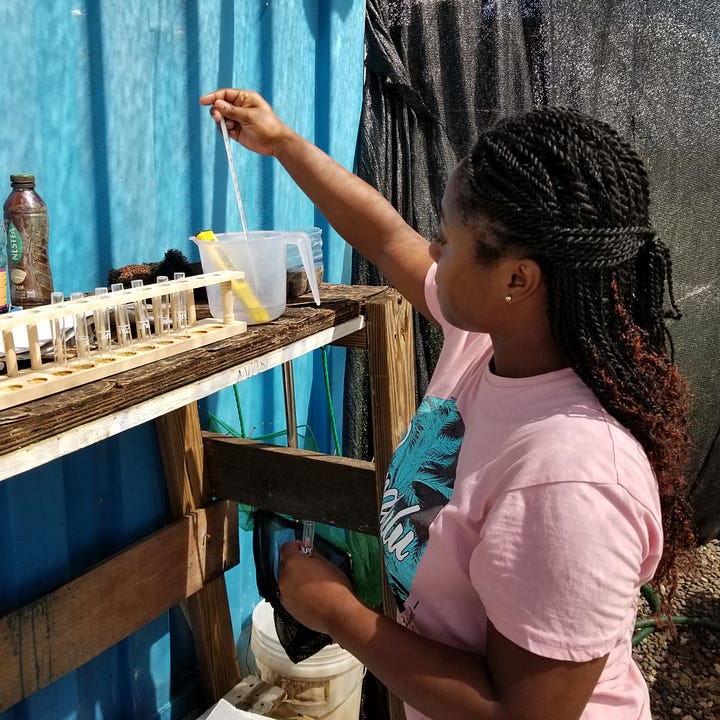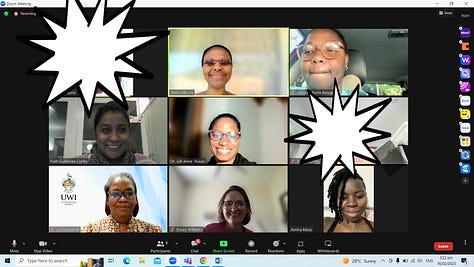Celebrating Women in Caribbean Aquaculture 2024
International Women's day, WiCA's New Chair and a women's networking lime
International Women's Day is a global celebration observed on March 8th every year, and WiCA will be celebrated on March 20th.
Women’s day is a day dedicated to recognizing the achievements and contributions of women throughout history, as well as raising awareness about the challenges they face in various aspects of life. The day also serves as a call to action for gender equality and women's rights. The overall goal is to promote gender parity and work towards a more inclusive and equitable society. It is a day to honor and appreciate the achievements of women while acknowledging the work that still needs to be done to achieve true gender equality.
Introducing the interim Chair for WiCA

2024 makes year 2 since the formation of WiCA ( please read more about last year’s formation under the dropdown box of WiCA on this platform). We are growing exponentially and we would like to formulate a specific mission for this group, one of which is to have regular and consistent meetups. As a result, we need to have a leadership team guiding this very important group. We hope to be a support and mentorship group for all women in aquaculture and to encourage and inspire students who would like to enter this field.
I want to welcome our interim Chair, Mia Avril who volunteered to guide the creation of this role and assumed duties. Mia is one of the founders of WiCA and is currently on the Science Advisory board. You can read more about Mia on our website and the Fishsite.com
Read more about Mia at the link below
*We are looking for a Co-Chair so please let me know if you are interested.
REGISTER FOR OUR WOMEN’S DAY NETWORKING EVENT
https://us02web.zoom.us/meeting/register/tZMude2vpzwoHtVOtuNcQ46WlJsZxeEwXFPA
Why a group for women in aquaculture?
WiCA was formed to highlight women in the Caribbean, to create a safe space to voice concerns, share experiences in the school & workplace, provide mentorship to young women and encourage more women & girls into the aquaculture sector.
Women play a significant role in the field of aquaculture, contributing to various aspects of the industry, including research, management, entrepreneurship, and community development. Their involvement has grown over the years, breaking traditional gender norms and fostering a more inclusive and diverse aquaculture sector.
In Belize, most workers involved in processing are women from rural communities where unemployment levels are high and poverty is greatest.
In Cuba, female workers constitute 27 percent of the aquaculture workforce (19 percent are intermediate and higher education technicians; 11 percent have attended higher education institutions).
In Jamaica, about 8–11 percent of fish farmers are women who own and operate fish farms; and in processing plants, women dominate the workforce.
In Panama, 80 percent of the workforce in processing plants are women, but in the production sector only 7 percent of workers are women.
FAO, The State of World Fisheries and Aquaculture 2012
Here are some key aspects of women's involvement in aquaculture:
1. Farm Management and Operations:
Women are actively involved in managing and operating aquaculture farms, overseeing activities such as feeding, monitoring water quality, and disease control.
Women are particularly engaged in small-scale and family-based aquaculture operations.
2. Research and Development:
Women contribute to aquaculture research, working on projects related to breeding, genetics, nutrition, and disease management. Their expertise helps in developing sustainable and environmentally friendly aquaculture practices.
3. Entrepreneurship:
Women entrepreneurs are emerging in the aquaculture sector, establishing their businesses related to fish and shellfish farming, processing, and marketing. Initiatives supporting women-led aquaculture enterprises contribute to economic development and job creation.
4. Community Involvement:
Women often play a crucial role in community-based aquaculture projects, participating in decision-making processes and ensuring that local communities benefit from sustainable practices. They may also be involved in education and outreach to promote responsible aquaculture practices within communities.
5. Capacity Building and Training:
Women are actively engaged in training programs and capacity-building initiatives aimed at improving skills and knowledge in aquaculture. These programs empower women to take on leadership roles and enhance their contributions to the industry.
6. Advocacy for Gender Equality:
Women in aquaculture contribute to advocacy efforts promoting gender equality within the sector. Organizations and networks focused on women in aquaculture work towards creating a more inclusive and supportive environment.
7. Education and Outreach:
Women play a role in educating communities about the importance of sustainable aquaculture practices and the role it plays in food security and economic development.
While progress has been made, challenges such as access to resources, training, and markets still exist for women in aquaculture. Efforts to address these challenges and promote gender equality in the industry contribute to the overall sustainability and success of aquaculture practices worldwide.







If you have a buisiness or science that you would like to share and you would like to be a guest speaker at our Women’s meetings, please send me an email.
Happy Women’s Day on March 8th and don’t forget to register for our event!





